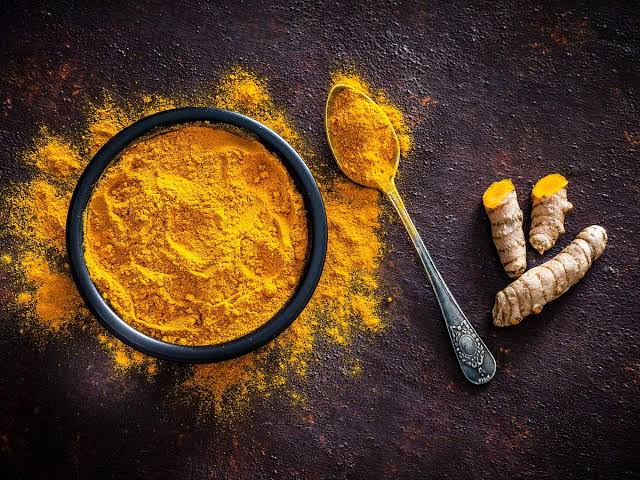Turmeric, often known as Indian saffron or the golden spice, is a tall plant native to Asia and Central America that produces a yellow spice.
Turmeric is a spice that is made from the pulverised roots of the turmeric plant, which we may find on shelves and in spice cabinets. Turmeric’s vivid yellow colour has encouraged numerous cultures to utilise it as a dye because of its vibrant yellow colour when processed. In addition to curry powder, turmeric powder is a key component in curries. Turmeric supplements, teas, powders, and extracts are just a few of the commercially available turmeric products.
Turmeric’s major element, curcumin, is a strong biological compound with a wide range of capabilities. Turmeric is recommended for a number of health concerns by Ayurvedic medicine, which is a traditional Indian style of treatment. Chronic pain and inflammation are examples of this. Turmeric is being investigated as a potential pain reliever and healing agent in Western medicine.
Continue reading to learn more about turmeric’s potential health benefits as well as some of its undesirable side effects.
Benefits of turmeric

Anti-inflammatory
According to the Arthritis Foundation, multiple studies have shown that turmeric can reduce inflammation.
This anti-inflammatory property may help to alleviate the aggravation that patients suffering from arthritis experience in their joints.
Turmeric capsules containing 400 to 600 milligrammes (mg) of curcumin can be taken up to three times per day, according to the foundation, to reduce inflammation.
It has the ability to ease pain
People, even doctors, have shared their personal anecdotal experiences using turmeric as a pain reliever in the past. In addition, the spice is said to be effective in alleviating arthritis pain.
Turmeric appears to be effective for pain management, with one study finding that it worked just as well as ibuprofen (Advil) in persons with knee arthritis, according to the researchers. Despite the fact that dose recommendations appear to differ, participants who took part in the study received 800 mg of turmeric in pill form on a daily basis.
It helps to improve the function of the liver
Due to the antioxidant properties of turmeric, it has recently gained a great deal of attention. According to preliminary evidence, turmeric’s antioxidant impact is so potent that it may prevent your liver from being damaged by pollutants. This could be excellent news for those who use powerful diabetes medications or other medications for other medical illnesses that have the potential to harm their liver if used for an extended period of time.
It may be beneficial in lowering the risk of cancer
Curcumin appears to have potential as a cancer therapy. According to research, it may have cancer-fighting properties against pancreatic cancer, prostate cancer, and multiple myeloma.
It can be beneficial to your digestion
Turmeric is included in curry powder in part because it enhances the flavour of the food by adding a wonderful ingredient to it. Turmeric, on the other hand, can play an important role in the digestion of that food. Turmeric’s antioxidant and anti-inflammatory characteristics can aid in the maintenance of a healthy digestive system, according to research.
It is utilised in ayurveda medicine to aid in the healing of the digestive system. Western medicine is now looking into how turmeric can aid with gut inflammation and gut permeability, two measurements of your digestive efficiency that are currently being investigated. A turmeric-based therapy for irritable bowel syndrome is currently being investigated.
Health risks
It has the potential to upset your stomach
When consumed in large quantities, the same chemicals in turmeric that help to promote digestive health can induce irritation in the digestive tract. Some participants in research investigating the use of turmeric as a cancer treatment had to withdraw from the study because their digestion was being adversely affected by the turmeric. Turmeric causes the stomach to create more gastric acid, which is beneficial. While this may be beneficial to some people’s digestion, it can be extremely detrimental to others.
It thins your blood
Turmeric’s cleansing effects may also cause you to bleed more readily as a result of their use. It’s not apparent why this is occuring. Other reported benefits of turmeric, such as decreased cholesterol and lower blood pressure, are likely related to the way turmeric interacts with the blood vessels in your body.
It is recommended that those who take blood-thinning medications such as warfarin (Coumadin) avoid taking significant amounts of turmeric.
It has the potential to promote contractions
It’s possible that you’ve read that eating dishes seasoned with curry will help to induce labour. Despite the fact that there is little clinical evidence to support this claim, research have shown that turmeric helps alleviate the symptoms of PMS. As a result, the old wives’ story may have some validity to it.
Women who are pregnant or breastfeeding should avoid using turmeric supplements just because of its blood-thinning effects. There shouldn’t be any issues with using tiny amounts of turmeric as a seasoning in your cooking or baking.
Conclusion
Including turmeric in your diet looks to have a number of health benefits, according to research. The golden spice has a variety of benefits, including supporting immunological health, pain relief, and digestive aid, among others. Turmeric, on the other hand, may not be worth taking for certain people because of some of its negative effects.
When considering whether or if turmeric is something you should try, it’s vital to proceed with caution. Talk to your doctor before using turmeric to address any health conditions that you may be suffering from, just as you would with any alternative therapy.
Sources
- Gupta, S. C., Patchva, S., Koh, W., & Aggarwal, B. B. (2012, March). Discovery of curcumin, a component of the golden spice, and its miraculous biological activities. Clinical and Experimental Pharmacology & Physiology, 39(3), 283-299
https://www.ncbi.nlm.nih.gov/pmc/articles/PMC3288651/ - The positive and negative health effects of turmeric https://www.medicalnewstoday.com/articles/318405
- Heck, A. M., DeWitt, B. A., & Lukes, A. L. (2000, July). Potential interactions between alternative therapies and warfarin. American Journal of Health-System Pharmacy, 57(13), 1221-1227
http://www.ajhp.org/content/57/13/1221.long - Khayat, S., Fanaei, H., Kheirkhah, M., Moghadam, Z. B., Kasaeian, A., & Javadimehr, M. (2015, April 9). Curcumin attenuates severity of premenstrual syndrome symptoms: A randomized, double-blind, placebo-controlled trial. Complementary Therapeutic Medicine, 23(3), 318-324
https://www.ncbi.nlm.nih.gov/pubmed/26051565 - Kuptniratsaikul, V., Thanakhumtorn, S., Chinswangwatanakul, P., Wattanamongkonsil, L., & Thamlikitkul, V. (2009, August). Efficacy and safety of Curcuma domestica extracts in patients with knee osteoarthritis [Abstract]. Journal of Alternative and Complementary Medicine, 15(8), 891-897
https://www.ncbi.nlm.nih.gov/pubmed/19678780 - Lauche, R., Kumar, S., Hallmann, J., Ludtke, R., Rampp, T., Dobos, G., … Langhorst J. (2016, June). Efficacy and safety of Ayurvedic herbs in diarrhoea-predominant irritable bowel syndrome: A randomised controlled crossover trial. Complementary Therapies in Medicine, 26, 171-177
https://www.ncbi.nlm.nih.gov/pubmed/27261998 - Lee, H.-Y., Kim, S.-W., Lee, G.-H., Choi, M.-K., Jung, H.-W., Kim, Y.-J., … Chae, H.-J. (2016). Turmeric extract and its active compound, curcumin, protect against chronic CCl4-induced liver damage by enhancing antioxidation. BMC Complementary and Alternative Medicine, 16(1), 316
https://www.ncbi.nlm.nih.gov/pmc/articles/PMC5000414/ - O’Connor, A. (2011, October 19). The doctor’s remedy: Turmeric for joint paint. The New York Times
https://well.blogs.nytimes.com/2011/10/19/the-doctors-remedy-turmeric-for-joint-pain/?_r=0 - Turmeric. (n.d.)
http://www.arthritis.org/living-with-arthritis/treatments/natural/supplements-herbs/guide/turmeric.php - Turmeric. (2016, September)
https://nccih.nih.gov/health/turmeric/ataglance.htm - Yu, Y., Wu, S., Li, J., Wang, R., Xie, X., Yu, X., … Zheng, L. (2015, February). The effect of curcumin on the brain-gut axis in rat model of irritable bowel syndrome: Involvement of 5-HT-dependent signaling. Metabolic Brain Disease, 30(1), 47-55
https://www.ncbi.nlm.nih.gov/pubmed/24807589






